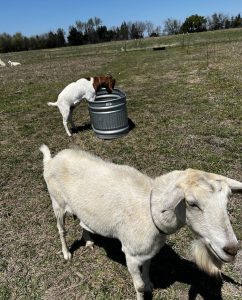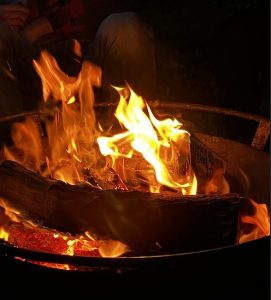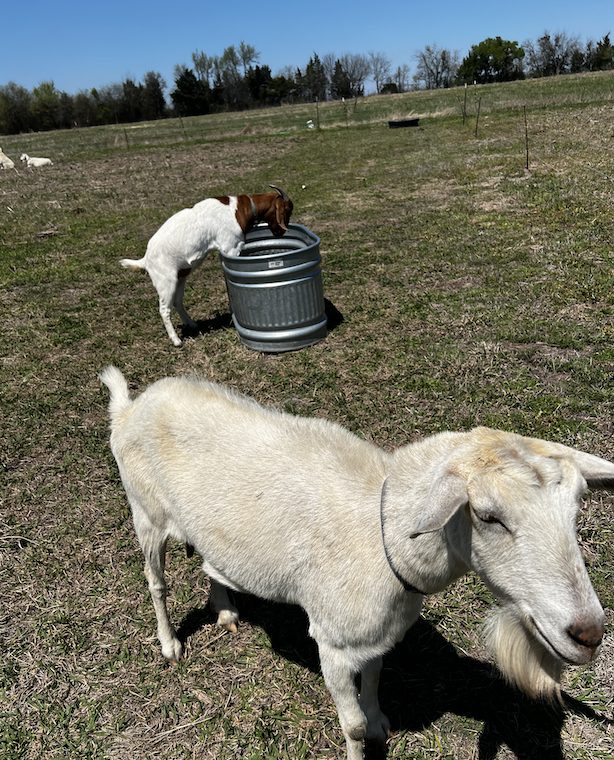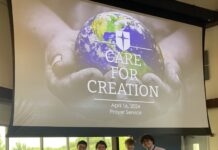From shoveling compost to propping up tents in the Texan heat, the Jesuit Junior World Hunger Relief in Waco was certainly an informative and captivating experience for everyone that participated. Dr. Riemer and Ms. Grindinger led the trip while Bo Jouette, Palmer Bowman, Drake Clark, Lawrence Jin, Devesh Amudala, Jack Fletcher, Carter McCormick, Orion Villarreal, Dillon Blair, and Seniors Dom Olinger and Matthew Dubiel participated. Throughout the trip, students learned about the importance of resource conservation, sustainable farming practices, and a scrumptious dose of local grown food.

Environmental Justice from a service member’s perspective
A few days after the trip, I interviewed Dr. Riemer on his perspective of the foray as the head of Jesuit service and what the trip meant to him as an educator.
Lawrence – Individually, what aspects of the immersion trip did you find valuable for the students who attended and why do you think it’s important to educate Jesuit students on environmental justice?
Riemer – That’s an important question. In terms of things that are important, I think all of it is important.. but, one of the things that we focus here is that we make sure as much things as possible locally, but the hunger farm is a unique mission so that it’s a great place to learn about not only sustainability; it’s a faith based institution, so that it’s a place we can go accompanied by great staff thats passionate about their work, and still be true to service, and it’s a nice place to go and have a reflective experience
I think from a “hands on” service perspective, I think it’s great for students to get in and get their hands dirty – I think it’s great to be outside and experience nature is very important. You guys don’t have very many opportunities to do that as we spend our times indoors and not get many ways to connect with nature. It’s great to see where our food comes from, and find an appreciation for our food, which is important in sustainability and eating equitably. I think it’s important to know where our food comes from, which is great for students to “pull something out of the ground and eat it”, which for some students doesn’t happen. That piece of it is a lot of the experience, and the reflections we do is where we can share what we’re thinking and a way to make some connections between the experience we’re having and how it is a part of the “justice picture” of the trip.
Lawrence – I see, I definitely think justice is an important theme – so speaking on the “justice” aspect of the trip, what does environmental justice mean to you?
Riemer – Well, just the basic definition of environmental justice is: making environmental choices to minimize the negative impacts that these choices can have on vulnerable communities. The truth is, most of these negative impacts can escape the privileged lives we live; so it’s understanding that and making choices at an individual level to do less and hopefully no damage to vulnerable communities.
Lawrence – Would you say theres an “immersion” aspect to what it’s like living “sustainably”?
Riemer – Yeah, that the point to the “trick”, it is the way we live sustainably and improving upon our water usage. Y’all spent part of your day working on a water capturing system, so it’s good to be mindful of where our food comes from – don’t over-farm, don’t overeat, don’t over-consume, and not wasting food – it’s an important part to experience a part of environmental justice. Camping itself is also a part of just experiencing the outdoors and living on the edge of modern society.
Lawrence – I see. Well, on a little more specific point of the trip, what do you think is the most memorable of the trip?
Riemer – Well, for me and Ms. Grindinger, I know that it’s just us watching you guys be in an element thats new for a lot of you all. Justice the communal and playful moments that comes from y’all (the students) – a lot of you all don’t know each other, and getting something memorable together is memorable for us as adults. For me, I don’t cook for myself or my family and friends, I do a lot of eating out – so personally, getting connected to what create and also preparing that for you guys is a lot of fun. Preparing a really nice meal that’s some of the best you eat all year is really special.
Lawrence – Yes the food was very special. Do you think more students should sign up for this trip and if so, what would you tell them to get them to come?
Riemer – Yeah, so this year was kind of an experiment, we kinda envisioned this program when we thought we were going to be dealing with the pandemic for a long time. We thought it would be beneficial for students to camp outside of the COVID pandemic – we think it has been successful enough to keep it for next year even though we’re shifting back to how we normally do things at school. I think it should be a juniors only next year except for a few seniors that will help lead. Last fall, it was a senior trip so it would be better to have more seniors.
Lawrence – I see, well this is the last question and it’s going to be a little broad – What are the parts of this trip that makes you enjoy service?
Riemer – I like the physical labor piece. I think doing some sweat equity and doing some hard work and seeing something go from completely flat to something that is meaningful. For example – while we were weeding the garden, we can see the progress being made physically in real-time – or like the gravel pad on the water tank as well. Oftentimes, in service, we don’t get to see a tangible result. For example, when you tutor a child, you often don’t get to see the long-term results of what is happening. Any opportunity we have to see a physical result of our effort is valuable. Whether it’s working on the farm, traveling together, or doing anything, just being with other people in service is really valuable. Service is not necessarily about having a good time, but it always is more enjoyable and pleasurable to do it with other people by having interesting conversations and learning from them.
An unforgettable experience

First night
As the students arrived, they were greeted by our guide and farmer, Tony Sky. Mr. Sky graciously welcomed us to the farm. He explained the core values of a local Christian organization, such as the World Hunger Relief farm. The students learned about their nearly 40 years of conservation history while strolling through the gravel-strewn road. The students were taught the importance of locally sourced food and the detrimental effects of food waste. Soon after, we were left to set up the tents in a run-down patch of field that was also a former pigpen. Many students struggled with the setup process as the tough dirt contrasted with the comfortable mattresses many of us are used to. Shortly after nightfall, the temperature dipped, and many campers huddled beside the campfire. Mr. Sky sent students to help with cooking dinner as chaperones Dr. Riemer and Ms. Grindinger cooked up an exquisitely roasted Barbecue Chicken with a tossed salad. Soon after, we ended the night after a brief reflection beside the campfire.
Second Day
It’s 6 AM, and with sub-50-degree temperatures, a select group of campers was woken up by their alarms to begin their morning chores and feed the farm animals. We were ushered to the chicken coop first, where Mr. Sky briefly explained the amusingly hierarchal structure of roosters and hens. We learned that the farm produces roughly 100 eggs a day and would produce more during the later seasons. As we brought the food bucket near to feed the chickens, they each walked out of their lodgings smartly and fed on the food scraps laden out for them. Shortly after, we rode the farm’s pickup truck over to the goat pasture. We replaced the hay bales with fresh stacks of dried grass. The animals inched forward shyly at the curious onlookers still inside the pickup truck. After the students fed the animals, we returned to home camp and began our workday. Students mainly worked in the farm’s garden, sifting through compost and weeding out the pastures during the first day. All of the campers worked tirelessly throughout the day as we reflected on the importance of food conservation by experiencing the laborious process of tending a farm patch. During our reflection, the students contemplated ways to improve the function of living through sustainable agriculture.
Third-Day
On the third day, students were gathered together to lay gravel beneath a tank of water to stabilize the foundation. Students learned teamwork as we worked together to lift the heavy water tank and shovel out the grass beneath. Next, the students were broken up into small teams to work on miscellaneous projects on the farm, such as fixing a broken gate in the pigpen, helping out interns moving into the farm, and chopping firewood. As the third day concluded, most campers were exhausted. We enjoyed a rewarding dinner and ended the night with some hot chocolate and toasted marshmallows beside the fire.
Last Day
The last day of the trip was one of reflection as we contemplated how we could contribute to more sustainable efforts to conserve the environment and to value the hard work done by farmers on the farm. While at Church before our departure back to Jesuit, The chaperones pushed us to connect faith to environmentalism. We were asked questions: Why does God’s creation surround us? Is it our duty as humans to be the stewards of God’s kingdom? What are we called to do as we walk the earth? These are all critical questions to consider as they’re relevant to changing the world and connecting what we do back to faith and why that is important to our role as humans. As we drove back to school, we were encouraged to think about the impacts of environmental degradation and think about ways to make a change in the future as we adopt professional careers after high school.
Cooking
One central theme of the Waco world hunger relief trip was food. We were not only taught to grow responsibly but also to cook responsibly. As for me, Devesh and Orion, we helped to cook on the first night; Ms. Grindinger accompanied us to skin the chickens and taught us the importance of taking care of maintaining our surroundings. We practiced teamwork as Devesh, and I worked hard to peel the chicken thighs, and Orion separated the leg bones and thighs. After the meticulous work, we were told to carefully wipe down our environment as guests at the farm; it was also our responsibility to leave the cooking environment as clean as we found it. Here, we learned that environmental justice applies not only to nature but also to human creation.
Fully immersing in nature
On the final night of the trip, the students gathered to roast marshmallows by the campfire and reflect upon our service. I looked up at the night sky and noticed that absent our anthropogenic effects on the atmosphere, the sky, usually dimly lit by city lights, shone brightly with stars. Being fully enmeshed within the chirping cicadas and occasional breeze served as a spiritual break from the busy lives of an everyday student. Ironically – it felt easier to reflect on our choices both inside and out of school.
Conclusion
Of course, spending four days on a modern farm sleeping in comfortable tents would not grant a fully immersive experience of living rurally – however, the lessons it teaches would certainly inspire many to live with sustainability in mind, which is an ever-growing issue in the modern world.
Stay Tuned for more on Jesuit Roundup






